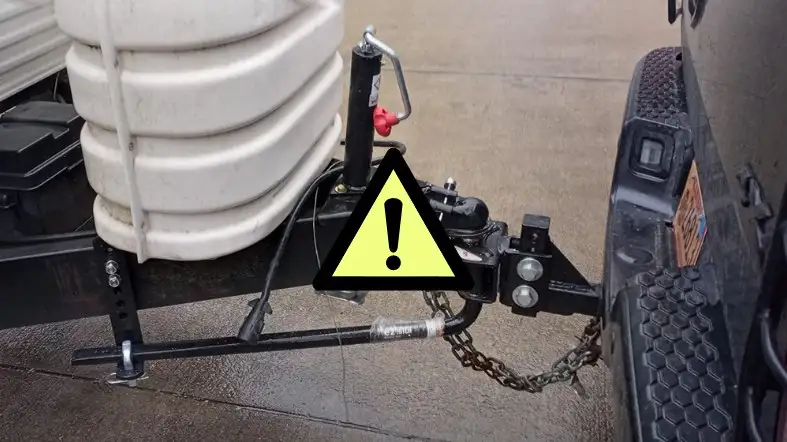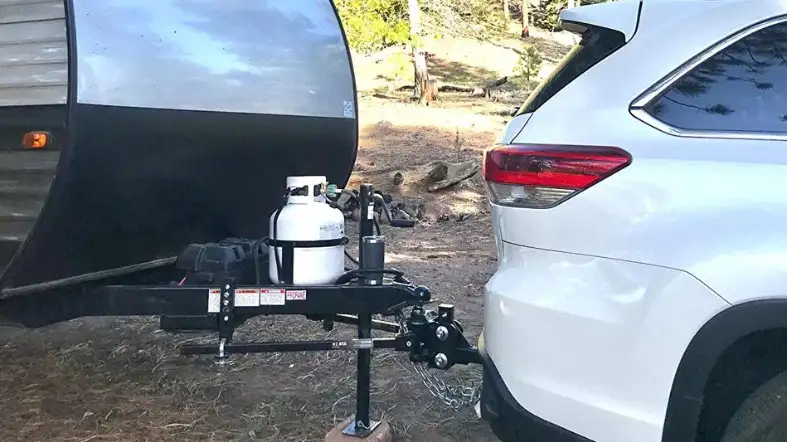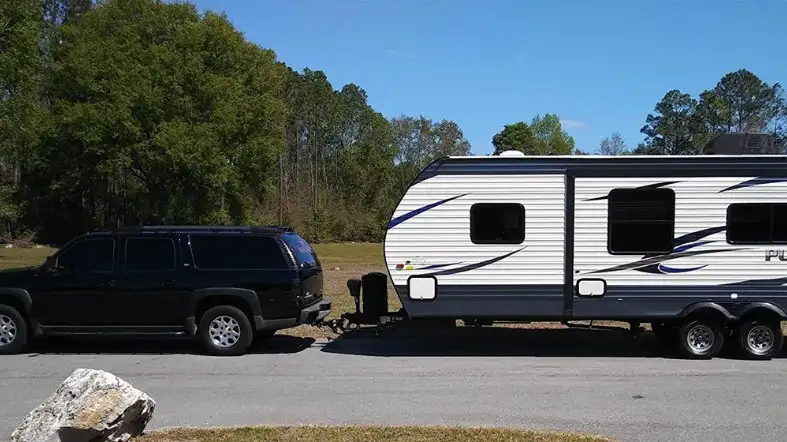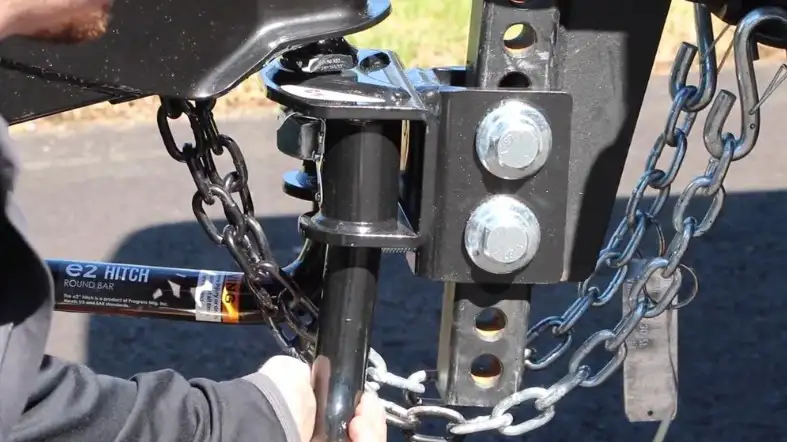The E2 hitch is a type of hitch that is used to connect a trailer to a tow vehicle.
It is a popular hitch option because of its simplicity and ease of use.
However, like any other type of hitch, the E2 hitch can also experience problems.
In this blog post, we’ll take a closer look at the E2 Hitch Problems that people are having and try to figure out why they’re happening.
We’ll also offer some solutions to these problems so that you can get back on the road.
Common E2 Hitch Problems

Some common issues that may arise with an E2 hitch include difficulty in attaching or detaching the trailer, difficulty in aligning the hitch ball with the trailer coupler, and issues with the hitch’s weight capacity.
These problems can result in poor towing performance, which can be dangerous for both the driver and other road users.
Here are the top 5 most common E2 hitch problems:
1. Difficulty In Attaching Or Detaching The Trailer
One of the most common E2 hitch problems is difficulty in attaching or detaching the trailer.
This can happen when the trailer coupler is not properly aligned with the hitch ball, or if the hitch is not securely fastened to the tow vehicle.
In some cases, the trailer may be too heavy for the hitch’s weight capacity, making it difficult to attach or detach.
To prevent this issue, it is important to ensure that the hitch is properly attached and aligned before towing. And to check the weight capacity of the hitch to ensure it is suitable for the trailer being towed.
2. Difficulty In Aligning The Hitch Ball With The Trailer Coupler
Another common issue with the E2 hitch is difficulty in aligning the hitch ball with the trailer coupler.
This can happen if the trailer is not properly positioned behind the tow vehicle, or if the hitch is not properly adjusted.
To prevent this problem, it is important to carefully position the trailer behind the tow vehicle. Adjust the hitch as necessary to ensure that the hitch ball and coupler are properly aligned.
3. Issues With The Hitch’s Weight Capacity
One of the key factors in determining the performance of an E2 hitch is its weight capacity.
If the hitch is not rated for the weight of the trailer being towed, it may not be able to handle the load, leading to poor towing performance and potential safety hazards.
To prevent this issue, it is important to carefully check the weight capacity of the hitch and ensure that it is suitable for the trailer being towed.
4. Wear And Tear On The Hitch
Over time, the E2 hitch may experience wear and tear due to regular use.
This can lead to problems such as reduced weight capacity, difficulty in attaching or detaching the trailer, and other issues.
To prevent this problem, it is important to regularly inspect the hitch for signs of wear and tear and to replace the hitch if necessary.
5. Damage To The Hitch Or Trailer
Another common issue with the E2 hitch is damage to the hitch or trailer.
This can happen due to accidents or collisions, or simply due to the rigors of regular towing.
To prevent this problem, it is important to inspect the hitch and trailer for signs of damage regularly and to repair or replace any damaged parts as necessary.
What can cause E2 Hitch Problems?
Some common causes of E2 hitch problems include:
Improper installation
If the E2 hitch is not properly installed, it can lead to problems such as wobbling, poor stability, and increased wear and tear on the hitch and the trailer.
Incorrect use
If the E2 hitch is used in a way that it is not intended for, such as carrying a load that is too heavy, it can result in damage to the hitch and the trailer.
Wear and tear
Like any mechanical device, the E2 hitch is subject to wear and tear over time.
Over time, the hitch can become damaged or broken, leading to problems such as instability, wobbling, and reduced towing capacity.
Lack of maintenance
Regular maintenance is crucial for ensuring the longevity and performance of the E2 hitch.
If the hitch is not properly maintained, it can lead to problems such as rust, corrosion, and reduced towing capacity.
Road conditions
The E2 hitch is designed to withstand harsh road conditions, but it can still be damaged by extreme weather, rough terrain, and other factors.
If the hitch is exposed to these conditions, it can lead to problems such as damage, instability, and reduced towing capacity.
How Can You Prevent E2 Hitch Problems?
Fortunately, there are several things you can do to prevent these issues and ensure that your hitch works smoothly.

Below we will give some tips on how to spot potential hitch problems and what you can do about them.
Properly maintain the E2 hitch
It is important to regularly inspect and maintain the E2 hitch to ensure that it is in good working condition.
This includes cleaning the hitch ball and coupler, checking the hitch pins and clips, and lubricating the hitch ball and coupler.
Regular maintenance can prevent issues such as rust and corrosion, which can lead to hitch failure.
Use the correct hitch ball and coupler
Ensuring that the hitch ball and coupler are properly matched is crucial for proper hitch operation.
The hitch ball should be the correct size and weight capacity for the trailer, and the coupler should be compatible with the hitch ball.
Using the wrong hitch ball or coupler can cause difficulty in attaching or detaching the trailer, as well as issues with towing performance.
Properly install the E2 hitch
The E2 hitch should be properly installed according to the manufacturer’s instructions.
This includes attaching the hitch to the tow vehicle’s frame using the correct mounting hardware and torque specifications.
Improper installation can lead to hitch failure and poor towing performance.
Use the correct weight distribution system
If the trailer being towed is heavy, it is important to use a weight distribution system to distribute the weight evenly across the tow vehicle and trailer.
This can prevent issues such as swaying and poor towing stability, which can be dangerous while on the road.
Properly load the trailer
The weight of the trailer and its cargo should be distributed evenly and within the E2 hitch’s weight capacity.
Overloading the hitch can cause issues such as hitch failure and poor towing performance.
It is important to check the weight of the trailer and its cargo before towing to ensure that it is within the hitch’s weight capacity.
Regularly check the hitch and towing setup
Before each towing trip, it is important to check the E2 hitch and towing setup to ensure that everything is properly attached and functioning properly.
This includes checking the hitch ball and coupler, the weight distribution system, and the trailer’s brakes and lights.
Any issues should be addressed before hitting the road.
Use caution while towing
When towing with an E2 hitch, it is important to use caution and follow all safety guidelines.
This includes driving at a safe speed, staying within the hitch’s weight capacity, and avoiding sharp turns and sudden stops.
Taking these precautions can prevent issues such as swaying and loss of control while towing.
How To Handle An E2 Hitch Problem When Driving?

If you experience an E2 hitch problem while driving, it is important to handle the situation carefully to ensure the safety of yourself and other road users.
Here are some steps to take to handle an E2 hitch problem while driving:
Pullover
If you notice that the trailer is wobbling or becoming unstable, the first thing you should do is safely pull over to the side of the road.
This will allow you to assess the situation and take appropriate action.
Check the hitch and trailer
Once you have safely pulled over, check the hitch and trailer to see if you can identify the cause of the problem.
Look for signs of damage, wear, and tear, or other issues that may be causing the problem.
Check your load
Make sure that your trailer is not carrying a load that is too heavy or unbalanced.
This can cause problems with the hitch and the trailer, so it is important to ensure that your load is within the recommended weight limits and is properly balanced.
Contact a professional
If you are unable to identify the cause of the problem or if you are unsure how to fix it, it is best to contact a professional for assistance.
A trained mechanic or trailer technician will be able to diagnose the problem and provide the necessary repairs to fix the hitch.
Follow the instructions
If you contact a professional for assistance, be sure to follow their instructions carefully.
This will help ensure that the hitch is repaired correctly and that it is safe to continue driving.
Keep a safe distance
After the hitch has been repaired, it is important to keep a safe distance from other vehicles on the road.
This will give you enough time to react if the hitch problem recurs or if any other issues arise.
How Do You Know If You Need An E2 Hitch Replacement?

If you notice any of the following issues with your hitch, it may be time to consider an E2 hitch replacement:
- Visible cracks or damage to the metal components of your hitch
- Loose bolts, nuts, or other parts that could impact the stability and security of your hitch
- Issues with your vehicle’s receiver, such as wobbling or swaying
- Signs of rust or other wear and tear on the hitch components
So, if you notice any of these things happening to your E2 hitch, then it may be time for an E2 hitch replacement.
Should You Repair or Replace Your E2 Hitch?
The best way to decide whether to repair or replace your E2 hitch will depend on the nature of the issue and the extent of any damage.
For minor wear and tear, it may be possible to simply perform some simple repairs or maintenance that can help extend the life of your hitch.
For example, repainting your hitch or replacing any worn or damaged components may be all that’s needed to keep it running smoothly.
If your E2 hitch suffers more significant damage, such as rust, cracks, dents, or broken welds, then you may need to consider replacing it entirely.
Depending on the extent of the damage, it may be cheaper and easier to purchase a new hitch than to attempt costly repairs.
FAQs About E2 Hitch Issues
Is It Possible To Rust Out And Damage My E2 Hitch?
Yes, it is possible to rust out and damage your E2 hitch if you do not properly maintain and care for it.
This can be due to exposure to harsh weather or chemicals, as well as improper use or handling of the hitch.
Should I Grease My E2 Hitch?
Yes, it is generally recommended to grease your E2 hitch periodically in order to keep it running smoothly and prevent excessive wear and tear.
This may involve greasing the ball or other components of the hitch, depending on its design and usage.
What Should I Do If My E2 Hitch Starts Creaking?
If you notice your E2 hitch starting to creak or make other noises, this may be a sign that it is due for some maintenance or repairs.
Depending on the severity of the damage, you may need to take your hitch to a repair shop for professional attention, or you may be able to handle smaller issues yourself.
Conclusion
There are a number of E2 hitch problems you can face, from rusting and creaking to more serious damage.
When you notice any issues with your hitch, it is important to take action quickly to prevent further damage and ensure your safety on the road.
Whether you need simple repairs or a complete replacement, you can follow the above tips to help you decide on the best course of action for your particular situation.
